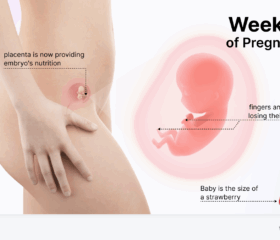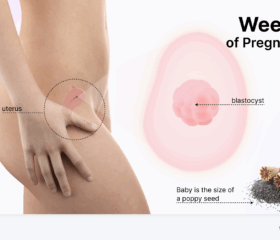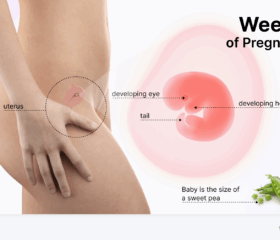Pregnancy Week by Week
16 Weeks Pregnant
Your baby is as big as an avocado.
4.75
inches
2.5
ounces
16 Weeks Pregnant: Symptoms, Your Baby’s Development, and Tips
Many of the most troublesome early pregnancy symptoms may have subsided by now. It’s still important to take care of yourself, but hopefully, you’re feeling pretty good.
Read on to learn all about where your baby is at in her development, what new (and lingering) symptoms you should be prepared for, and what you need to do to keep you and your child healthy in your 16th week.
Your baby at 16 weeks
Your bundle of joy is now about the size of an avocado, weighing 2.5 ounces and measuring 4.75 inches from crown to rump. 123
Here’s everything that’s going on with your little one at this time:
- Skin: Your baby’s skin is still thin, meaning her blood vessels might or might not still be visible. If they are, it’s normal—her skin will thicken over time.
- Hair: Your baby’s hair follicles, eyelashes, and eyebrows are all forming.
- Muscles: Your baby‘s neck and back muscles are now strong enough for her to lift her head, at least a little. She might even have enough facial muscle control to start expressing her feelings. In ultrasounds, you may occasionally see her sport tiny smiles.
- Organs and bones: Your child’s liver and pancreas are working harder. Her blood and urine production are both in full swing, and her bones are beginning to harden.
- Senses: Even though your baby’s eyes are closed, she can now sense light. She can hear sounds, too, so this is a great time to start talking, singing, and playing music to her.
We’ve saved the most exciting milestone for last: as we mentioned, now’s also the time when you might feel your baby’s first movements. You may feel your baby kicking or feel tiny flutters or taps.
If you’ve had kids before, you might also have felt this a little earlier than 16 weeks. “Quickening,” the term for your baby’s first perceptible movements, usually starts later for first-time mothers.

Your body at 16 weeks
Your baby bump is still growing, and you might start showing by now, although that isn’t guaranteed—some women take longer to show. The size of your belly at 16 weeks depends on your body type and whether this is your first pregnancy (if it is, your uterus will take longer to expand).
You’ve probably gained a few pounds since your first trimester. You’re eating for two now, so gradual weight gain is healthy and expected.
Pregnancy symptoms at 16 weeks
Again, hopefully, most of the roughest pregnancy symptoms are behind you. Morning sickness and fatigue usually peak in the first trimester and fade afterward.
However, that doesn’t mean you’ll be completely symptom-free. You might experience:
- Round ligament pain: Your uterus is expanding to accommodate the life growing inside you. This means you might sometimes feel quick, sharp pains on the sides of your belly as the ligaments supporting it stretch.
- Back pain: As your body changes, your posture will change, too, leaving you prone to backaches. Hormonal fluctuations can also loosen your ligaments and exacerbate your lower back pain during your pregnancy.
- Congestion and bleeding gums: Increased blood flow can make for swollen nasal passages and gums. Drink lots of water, and don’t neglect your oral hygiene to reduce your risk of experiencing bleeding gums during pregnancy.
- Breast changes: Your breasts may swell as your body continues to prepare for breastfeeding. You can offset breast pain during pregnancy by using maternity bras.
- Constipation: During pregnancy, your shifting hormones and growing uterus will both contribute to the slower rate at which food moves through your GI tract, leading to constipation.
- Gas and bloating: You may experience gas and bloating during your pregnancy as a (potentially embarrassing) side effect of the hormone progesterone, which relaxes all of your muscles—including the ones in your digestive tract.
- Dry eyes: This is another possible effect of your hormones being in flux. Your eyes might be unusually dry or irritated in your 16th week.
- Pregnancy brain: Believe it or not, this is a real thing! You might catch yourself forgetting things or otherwise being unusually scatterbrained in this stage of your pregnancy.
On the plus side (and fortunately, there is a plus side), you may experience positive changes in your body, too. “Pregnancy glow” isn’t a myth. Many moms get more radiant skin, thanks to their surging hormones and improved circulation. You’ll likely also find yourself sporting a thicker head of hair, and your nails might grow stronger. 4
As with so many other aspects of pregnancy, all of this can vary, and some women experience the opposite (i.e., weaker nails, breakouts of pregnancy acne, and dry skin). 5 If you’re one of the less-than-lucky ones, don’t worry. Those symptoms might be annoying, but they’re still normal, and like the others, they’ll fade in time.
Tips to tackle your discomfort
Here are a few strategies to help you weather the challenges you’ll experience during your 16th week:
Exercise and stretching
To alleviate your back pain (and leg cramps, if you have them), incorporate moderate exercise into your daily routine. Some of the best pregnancy workouts include walking, swimming, and pilates. There are many benefits of doing prenatal yoga, too. Make sure to stretch your back after you work out.
Your doctor might also recommend doing pelvic floor exercises. These consist of flexing or squeezing your pelvic floor muscles—the ones around your bladder—for short periods (10 seconds or so). 6 In addition to easing some of your symptoms, this will prepare you for the actual birthing process and potentially help you recover faster afterward.
Proper rest
Exercise is only helpful if you also take care to get enough rest. Don’t underestimate the impact of comfortable seating; an ergonomic chair and pregnancy-support pillow can do wonders. If your legs are hurting, try elevating them, too.
Nutrition
If you’re queasy, constipated, or bloated, eat healthy pregnancy snacks and smaller meals throughout the day (rather than a few larger ones), and eat a lot of fiber-rich foods, such as lentils and leafy greens. Stay away from soda and other carbonated drinks, along with foods that cause gas.
Ensure that your pregnancy diet includes plenty of protein. If you find meat turning your stomach—which isn’t unusual for women at this stage of their pregnancies—try plant-based sources, such as tofu or beans (although these aren’t the best choice if you’re struggling with gas).
You can also eat cheese while pregnant, along with yogurt, to get enough protein. However, make sure any dairy products you consume are made from pasteurized milk.
Skincare and eye care
If you have dry skin or you’re getting acne flare-ups, a gentle skincare routine is best. Talk to your doctor about this. Many skincare products are safe for pregnant women to use, but you need to avoid hydroquinone, topical retinoids, Isotretinoin, Tazarotene, and Spironolactone. 78
Relatedly, if you have dry eyes, over-the-counter lubricating eye drops are generally OK to use. You may also be able to get some relief if you install a humidifier (which will also help if you have a stuffy nose or frequent nosebleeds).
When do you need to see a doctor?
As you’re probably gathering, most of the symptoms you’ll experience at 16 weeks are minor and treatable with home remedies. However, there are a few symptoms that warrant a visit with your OB:
- Severe belly pain: As mentioned, you should expect small twinges from your stretching ligaments. If you experience cramping that goes well beyond that, it could indicate a problem. 9
- Strong or persistent headaches: While headaches are normal when you’re pregnant, if yours are unbearable or unrelenting, that could indicate an issue that requires treatment (on top of just making you miserable). 10
- Heavy bleeding or unusual discharge: Spotting and vaginal discharge during pregnancy are common, but heavy bleeding (enough to soak a pad) or discharge with a strong odor isn’t. 11
This list isn’t all-inclusive, so trust your gut and consult with your doctor if you feel that something may be amiss. Even if it turns out to be nothing, it’ll be worth it for the peace of mind.
Your 16-week prenatal visit
Even if you don’t have any symptoms that worry you, there’s a good chance you’ll be headed to the doctor this week for another routine prenatal visit.
Your OB might order another ultrasound, which will give you another chance to “see” your baby’s heartbeat. However, it’s also possible they’ll wait for a few more weeks until your next one.
They might also recommend the following tests:
- Urine test: You’ve probably had quite a few of these by now, but you aren’t done with them yet. These tests help your doctor monitor your health throughout your pregnancy.
- Amniocentesis: This involves removing a small quantity of amniotic fluid (the fluid your baby is suspended in) and checking it for signs of chromosomal abnormalities, such as Down syndrome, as well as other disorders. 12
- Alpha fetoprotein (AFP) screening: This is a type of blood test. Like amniocentesis, it allows your doctor to check for potential birth defects. 13
Both AFP tests and amniocentesis are elective (optional) procedures, and amniocentesis has a small chance of inducing a miscarriage, so your OB might or might not recommend them. That depends on the state of your health and pregnancy, as well as your family history.
Come prepared with questions
If—like many women—pregnancy has left your thoughts a little disorganized, it’s a good idea to write any questions you have for your practitioner down ahead of time. You can do this in a notebook or by using a note-taking or reminder app on your phone.
You might want to ask about vaccines, like whether or not it’s safe to get the flu shot while you’re pregnant (it usually is). It’s also worth asking about:
- Your current symptoms
- What to expect in the weeks to come
- What other tests or procedures you should get
- Your exercise regimen and diet
- Your birthing plan
- Any other concerns you have
Coming equipped with these will save you from forgetting something important in the moment. That can happen even if you don’t have pregnancy brain. Consider using a journal or pregnancy tracker app to log everything you need to discuss with your doctor (the best pregnancy trackers have dedicated journal spaces or checklists of questions for this).
Remember, you might be hearing your baby’s heartbeat again, and the excitement of that might push everything else out of your mind.
Final thoughts
Again, congrats on reaching week 16! While you’re no doubt doing your best to ensure your baby’s healthy development, don’t forget to take care of yourself, too.
If you haven’t already gotten pregnancy-friendly maternity clothing, it’s probably time. Ask your partner, family, or friends if you need any extra help with chores, and if you feel overwhelmed, don’t feel bad about giving yourself a break.
Something as simple as getting some “me” time with a manicure or retreating to a quiet corner to read, rest, and unwind can do wonders for your physical and emotional health. Remember, a happy mom makes for an even happier baby.
Article Sources
- National Health Service. "Week 16" Retrieved June 24, 2025.
- Raising Children Network (Australia) Limited. "16 weeks pregnant" Retrieved June 24, 2025.
- Baby Your Baby. "Fetal Growth Chart" Retrieved June 24, 2025.
- Johns Hopkins Medicine. "Pregnancy and Skin Changes" Retrieved June 24, 2025.
- Nemours KidsHealth. "10 Things That Might Surprise You About Being Pregnant" Retrieved June 24, 2025.
- University Hospital Southampton NHS Foundation Trust. "Pelvic floor muscle exercise sheet" Retrieved June 24, 2025.
- Canadian Family Physician. "Safety of skin care products during pregnancy" Retrieved June 24, 2025.
- American Academy of Dermatology Association. "Is any acne treatment safe to use during pregnancy?" Retrieved June 24, 2025.
- Tommy’s. "Stomach (abdominal) pain or cramps in pregnancy" Retrieved June 24, 2025.
- Tommy’s. "Headaches in pregnancy" Retrieved June 24, 2025.
- Tommy’s. "Bleeding in pregnancy" Retrieved June 24, 2025.
- MedlinePlus. "Amniocentesis (amniotic fluid test)" Retrieved June 24, 2025.
- Stanford Medicine Children’s Health. "Alpha-fetoprotein (AFP) Screening Test" Retrieved June 24, 2025.







